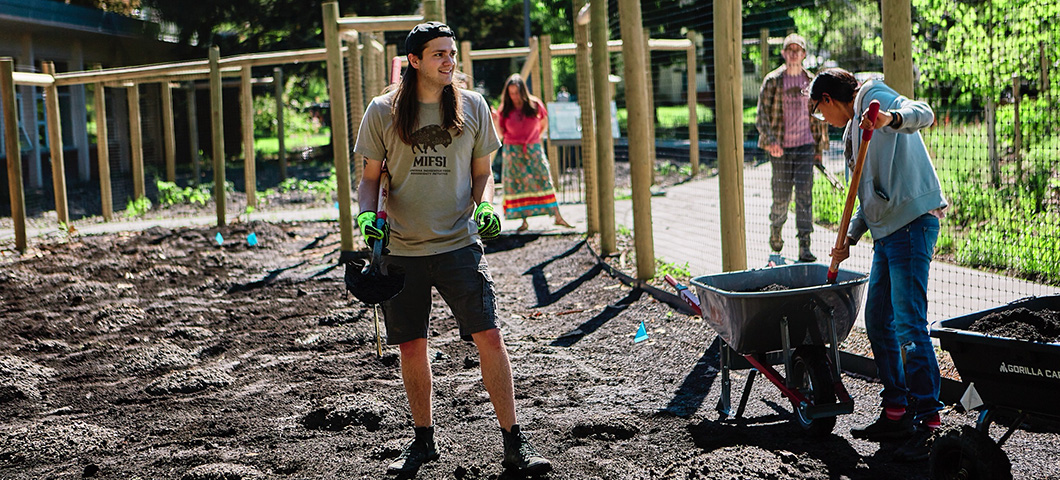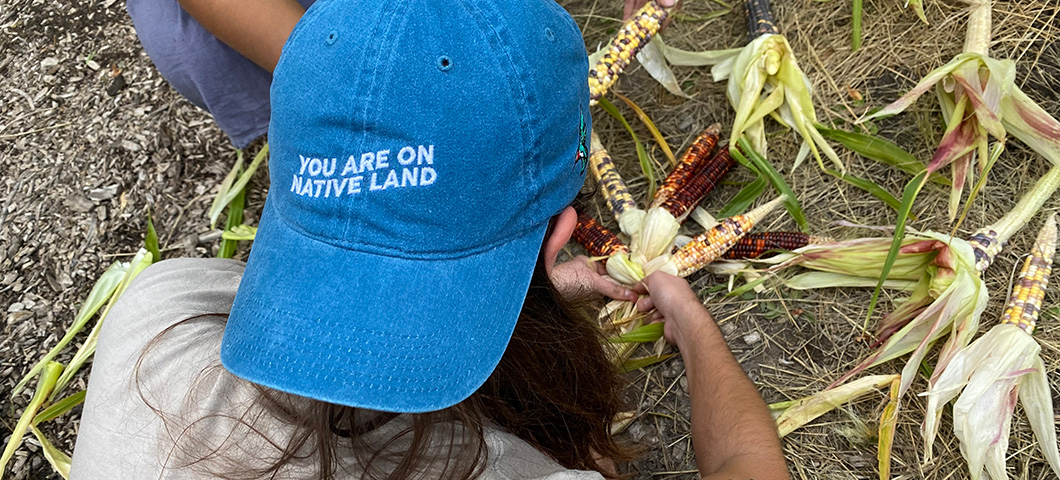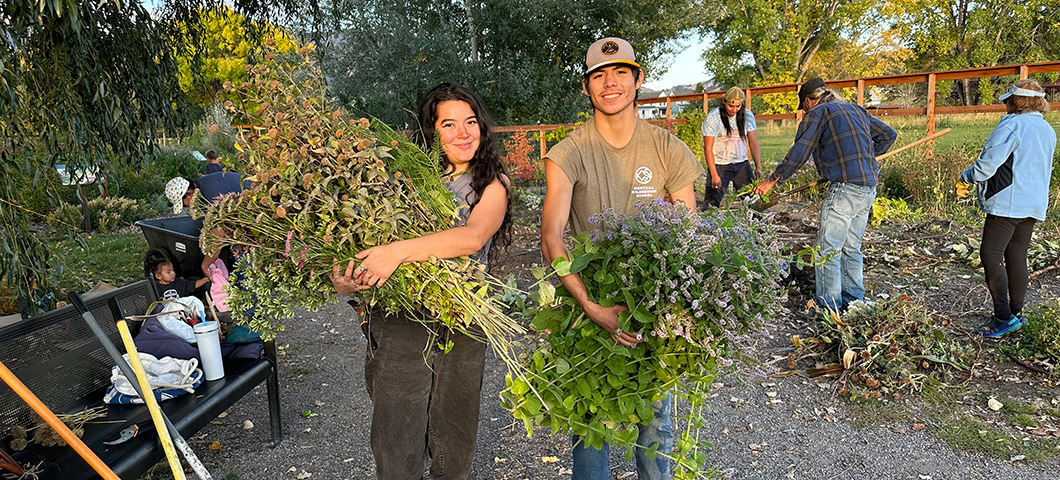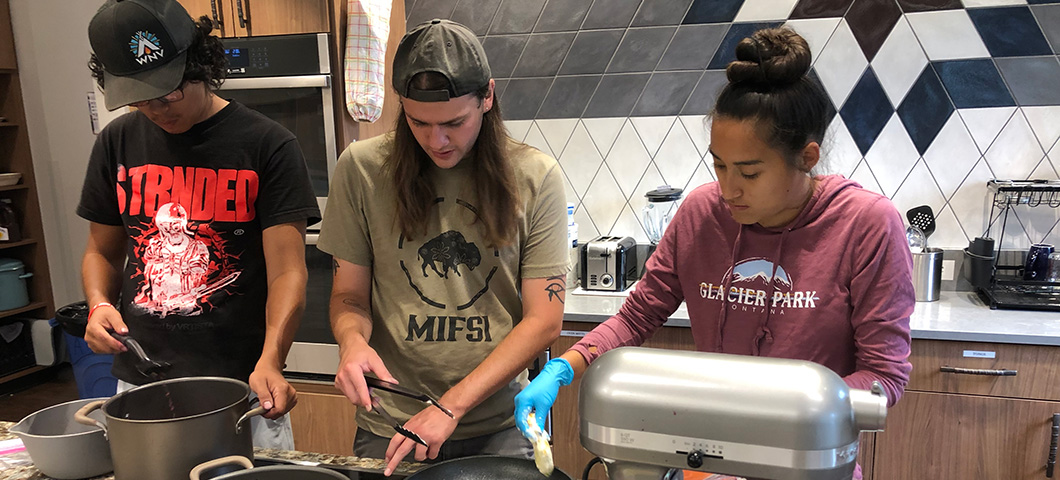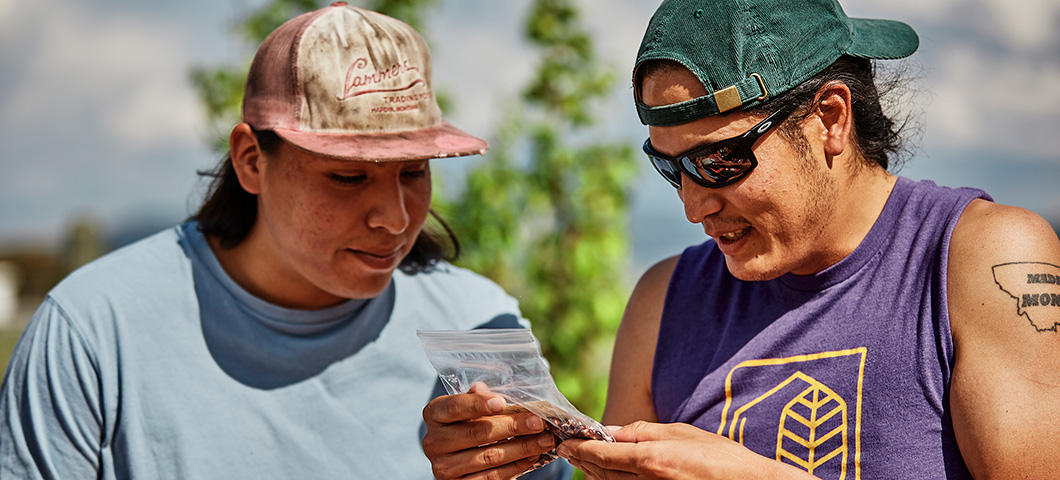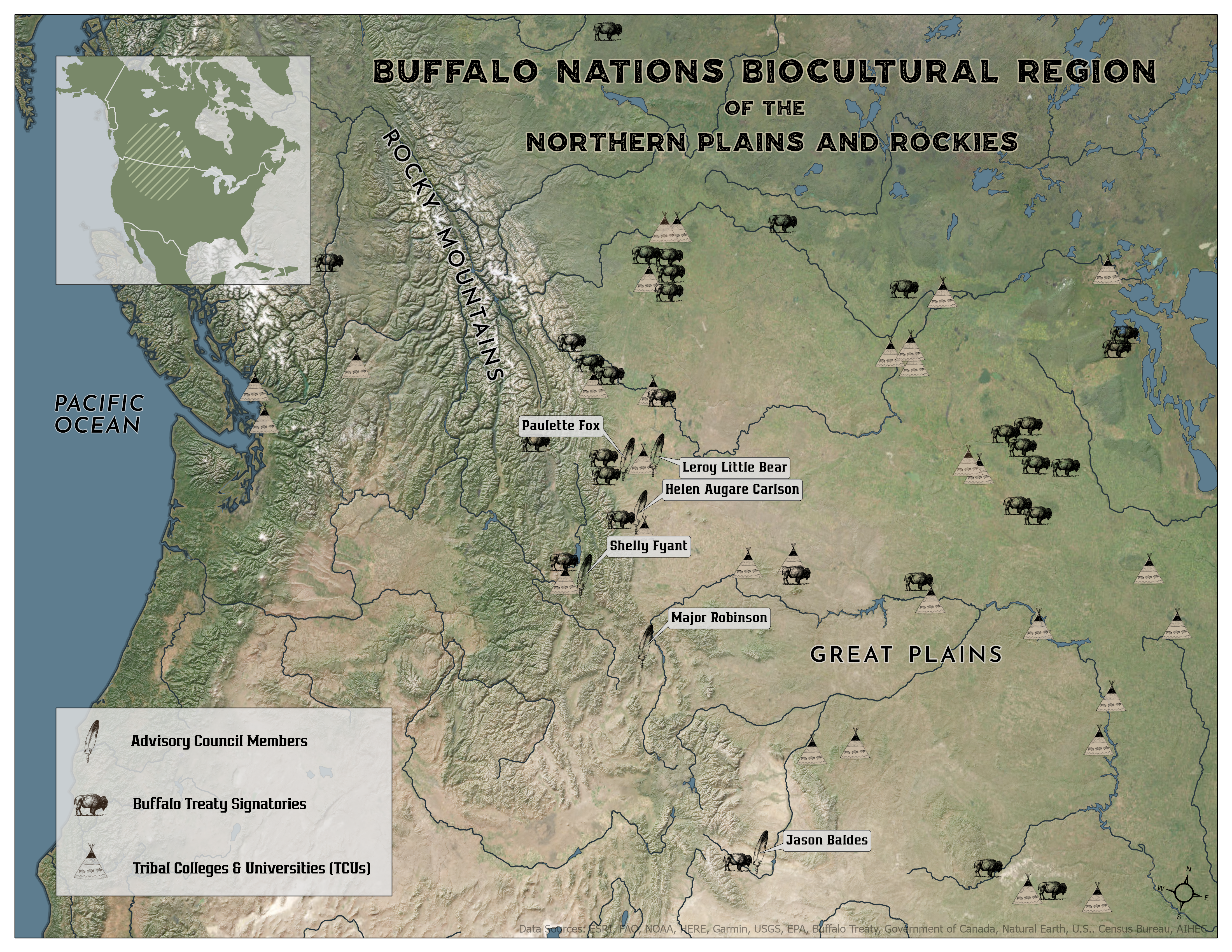Education and Research In Support of Intertribal Food Sovereignty
A collaborative project of the Department of Native American Studies and the College of Education, Health & Human development
Explore an interactive version of the map by clicking above.
Working in Indigenous-led partnerships with the Native Nations and Colleges of this biocultural region, the Buffalo Nations Food System Initiative is established to:
- educate and train the coming generations of Indigenous food system professionals
- create more opportunities for Indigenous food producers and businesses
- strengthen communities through Indigenous food knowledge and access
- invest in Indigenous research scholarship towards cultural knowledge recovery of foodways and innovations towards vital 21st century Indigenous food systems
- heal the Land and the People
An Education & Research Institute Designed to Build:
LAND GRANT INSTITUTIONS WORKING TOGETHER
As a state institution endowed by the land itself, Montana State University supports the development and prosperity of Indigenous food systems in this region as they are currently being re-created by the Native nations of the Northwestern Plains and Rockies. MSU is the primary four-year institution of choice for Native students in Montana. The Department of Native American Studies was recently accredited under the World Indigenous Nations Higher Education (WINHEC). MSU has substantial capacity for credentialing Indigenous food systems professionals and conducting Indigenous-led research relative to Indigenous food sovereignty.
Through Indigenous-led partnerships with other Land Grant institutions, the Tribal Colleges Units throughout the biocultural region, BNFSI is grounded in Indigenous knowledge of food systems and the priorities of Native nations. By partnering with tribal colleges and developing integrated programming at MSU, we envision building a strong research and education network in support of the re-vitalization of Buffalo Nations’ food systems.
WORKING AS A BIO-CULTURAL REGION OF RELATIVES
The Buffalo Nations food system was sustained through a web of relationship including the Land and the People. Moving beyond colonial boundaries (state, provincial, and federal) we are working together again in support of the web of relations.
SHARED CAPACITY IN CREDENTIALING
Indigenous food systems require human capacity from many different fields including agriculture, sustainable food systems, community nutrition, soil science, economics, hydrology, business, dietetics, fisheries management, and other natural resource fields. Buffalo Nations Food System Initiative is building a credentialing pathways forIndigenous food systems professionals working collaboratively with tribal and community colleges to put Indigenous knowledge in the lead while integrating Western ways of knowing. The first credentialing pathway is a graduate certificate in Indigenous Food Systems that can be paired with any undergraduate or graduate degree to give students grounding formation in Indigenous foodways knowledge.
GRADUATE CERTIFICATE IN INDIGENOUS FOODS—COMING IN SPRING 2025
Following an Indigenous ecological model of education, this four-class certificate will follow the annual seasonal round with a course for each season. The certificate will round out any degree pertaining to Indigenous food systems, for example in the fields of Nutrition, Business, Medical Fields, Earth Sciences, Agriculture, Economics, Culinary, and Sustainable Foods. Credentialing will happen in collaboration with partnering MSU colleges and TCUs.
Students will receive instruction from Indigenous knowledge holders, in a land-based model of education, preparing them as professionals equipped with a culturally-based approach to food sovereignty.
GIFTS OF LIFE
Our focus on ancestral foods lies relationship, education and research with the buffalo who stands at the center of our food system, and with the many other-than-human relatives—animal and plant relatives who have sustained us for millennia.
GOING TO OUR FIRST TEACHER
We put the Land, our first teacher, and traditional ecological knowledge, in front as we create programs of land-based education.
LEADING WITH LOVE
The Buffalo Nations Council ‘leads with love’ to draw together buffalo nations to build collective, collaborative, and proactive capacity for Indigenous food sovereignty. Working as relatives of the same food system, we are strengthening the bonds of relatives—alliances and trading relationships—that made our food system the most resilient and sustainable ever in North America.
LAND-BASED LEARNING ON AND OFF CAMPUS
As Indigenous food systems courses and student cohorts develop, land-based learning will be maximized both on and off campus. Working with Tribal Colleges, Native Nations, and private landowners, opportunities to learn from the Land will be offered in every course and encouraged as a central method of research inquiry. Through field trips, culture camps, and field work, students will have an opportunity to go to our first teacher, Mother Earth. The grounds surrounding the new American Indian Hall--a landscape of edible, ceremonial, and medicinal plants—will serve as a BNFSI outdoor learning laboratory and kitchen. Buffalo Nations also cultivates ancestral foods and seeds on the MSU Horticulture Farm.
MIFSI: WORKING FROM THE GROUND UP
The BNFSI hosts and works collaboratively with the non-profit organization, Montana Indigenous Food Sovereignty Initiative. MIFSI is a coalition of Indigenous young adults, supported by Indigenous elder-mentors, working to support and strengthen intertribal food sovereignty efforts. In 2021, this young organization distributed seed bundles to 200 family and community gardens including every Indigenous reservation in the state. To provide additional ancestral seeds for future bundles MIFSI interns and volunteers are stewarding a collection of ancestral varieties of corn, beans, squash, and sunflowers and growing these ancient regional varieties on the Montana State University Horticultural Farm in order to expand ancestral offerings in future seed bundle distributions.
- SEED CULTIVATION & SAVING: Buffalo Nations, working in collaboration with MIFSI, is cultivating, saving, snd sharing ancestral seeds as we develop an ancestral seed cooperative for the biocultural region of the Northwestern Plains and Northern Rockies.
- A NETWORK OF NATIVE GARDENERS: Through educational events and social media platforms, MIFSI provides education, technical support, and seed sourcing for and with Indigenous students at MSU and Indigenous gardeners in Montana.

